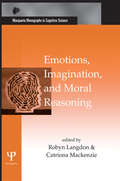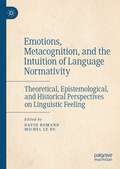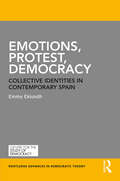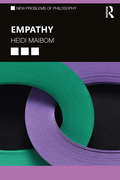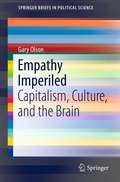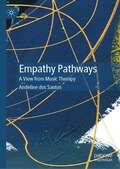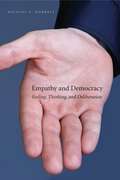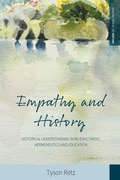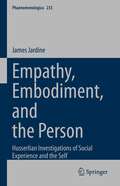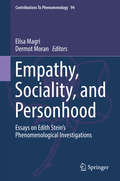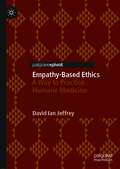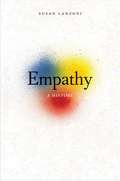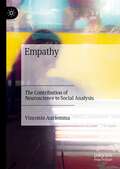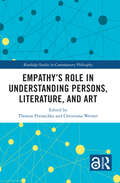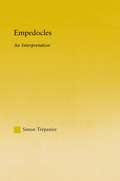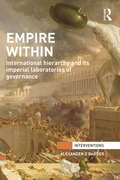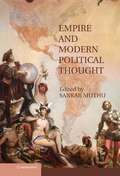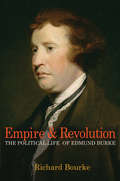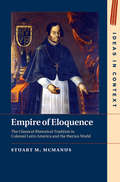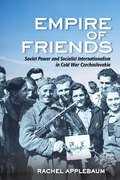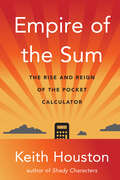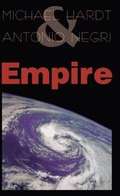- Table View
- List View
Emotions, Imagination, and Moral Reasoning (Macquarie Monographs in Cognitive Science)
by Robyn Langdon Catriona MackenzieThis volume brings together philosophical perspectives on emotions, imagination and moral reasoning with contributions from neuroscience, cognitive science, social psychology, personality theory, developmental psychology, and abnormal psychology. The book explores what we can learn about the role of emotions and imagination in moral reasoning from psychopathic adults in the general community, from young children, and adolescents with callous unemotional traits, and from normal child development. It discusses the implications for philosophical moral psychology of recent experimental work on moral reasoning in the cognitive sciences and neurosciences. Conversely, it shows what cognitive scientists and neuroscientists have still to learn from philosophical perspectives on moral reasoning, moral reflection, and moral responsibility. Finally, it looks at whether experimental methods used for researching moral reasoning are consistent with the work in social psychology and with philosophical thought on adult moral reasoning in everyday life. The volume's wide-ranging perspectives reflect the varied audiences for the volume, from students of philosophy to psychologists working in cognition, social and personality psychology, developmental psychology, abnormal psychology, and cognitive neuroscience.
Emotions, Metacognition, and the Intuition of Language Normativity: Theoretical, Epistemological, and Historical Perspectives on Linguistic Feeling
by David Romand Michel Le DuThis book proposes a comprehensive discussion of the issue of linguistic feeling, the subject’s metalinguistic capacity to intuitively apprehend the normative – lexical, syntactic, morphological, phonological… – dimensions of a definite language he or she is acquainted with. The volume’s twelve contributions aim to revisit a concept that, through a fluctuating terminology (“Sprachgefühl,” “sentiment de la langue,” “linguistic intuitions,” etc.), had developed, since the late 18th century, within a variety of cultural contexts and research traditions, and whose theoretical, epistemological, and historical ins and outs had not been systematically explored so far. Beginning with a long opening chapter, the book consists of two parts, one tracing the multifaceted approaches to linguistic feeling from Herder to Wittgenstein, and one offering a representative overview of the debates about the issue at stake in current linguistics and philosophy, while addressing the question of the place of metacognition, normativity, and affectivity in language processes.
Emotions, Protest, Democracy: Collective Identities in Contemporary Spain (Routledge Advances in Democratic Theory)
by Emmy EklundhWith the rise of both populist parties and social movements in Europe, the role of emotions in politics has once again become key to political debates, and particularly in the Spanish case. Since 2011, the Spanish political landscape has been redrawn. What started as the Indignados movement has now transformed into the party Podemos, which claims to address important deficits in popular representation. By creating space for emotions, the movement and the party have made this a key feature of their political subjectivity. Emotions and affect, however, are often viewed as either purely instrumental to political goals or completely detached from ‘real’ politics. This book argues that the hierarchy between the rational and the emotional works to sediment exclusionary practices in politics, deeming some forms of political expressions more worthy than others. Using radical theories of democracy, Emmy Eklundh masterfully tackles this problem and constructs an analytical framework based on the concept of visceral ties, which sees emotions and affect as constitutive of any collective identity. She later demonstrates empirically, using both ethnographic method and social media analysis, how the movement Indignados is different from the political party Podemos with regards to emotions and affect, but that both are suffering from a broader devaluation of emotional expressions in political life. Bridging social and political theory, Emotions, Protest, Democracy: Collective Identities in Contemporary Spain provides one of the few in-depth accounts of the transition from the movement Indignados to party Podemos, and the role of emotions in contemporary Spanish and European politics.
Emotive Language in Argumentation
by Douglas Walton Fabrizio MacagnoThis book analyzes the uses of emotive language and redefinitions from pragmatic, dialectical, epistemic and rhetorical perspectives, investigating the relationship between emotions, persuasion and meaning, and focusing on the implicit dimension of the use of a word and its dialectical effects. It offers a method for evaluating the persuasive and manipulative uses of emotive language in ordinary and political discourse. Through the analysis of political speeches (including President Obama's Nobel Peace Prize address) and legal arguments, the book offers a systematic study of emotive language in argumentation, rhetoric, communication, political science and public speaking.
Empathy (New Problems of Philosophy)
by Heidi MaibomEmpathy is one of the most talked about and widely studied concepts of recent years. Some argue it can help create a more just society, improve medical care and even avert global catastrophe. Others object that it is morally problematic. Who is right? And what is empathy anyway? Is it a way of feeling with others, or is it simply feeling sorry for them? Is it a form of knowledge? What is its evolutionary origin? In this thorough and clearly-written introduction to the philosophy of empathy Heidi Maibom explores these questions and more, examining the following topics: The nature of empathy and key themes in the literature Empathy as a way of understanding others, particularly 'simulation theory’ and 'perspective-taking' Empathy, emotional contagion, and sympathy Empathy’s role in moral understanding or motivation Empathy and art appreciation, with examples from film, music and fiction Empathy and mental disorder, such as psychopathy and autism. Including chapter summaries, annotated further reading and a glossary, Empathy is an excellent resource for students of philosophy of mind and psychology, psychology, and cognitive science, as well as for those in related subjects such as art, literature and politics.
Empathy Imperiled
by Gary OlsonThe most critical factor explaining the disjuncture between empathy's revolutionary potential and today's empathically-impaired society is the interaction between the brain and our dominant political culture. The evolutionary process has given rise to a hard-wired neural system in the primal brain and particularly in the human brain. This book argues that the crucial missing piece in this conversation is the failure to identify and explain the dynamic relationship between an empathy gap and the hegemonic influence of neoliberal capitalism, through the analysis of the college classroom, the neoliberal state, media, film and photo images, marketing of products, militarization, mass culture and government policy. This book will contribute to an empirically grounded dissent from capitalism's narrative about human nature. Empathy is putting oneself in another's emotional and cognitive shoes and then acting in a deliberate, appropriate manner. Perhaps counter-intuitively, it requires self-empathy because we're all products of an empathy-anesthetizing culture. The approach in this book affirms a scientific basis for acting with empathy, and it addresses how this can help inform us to our current political culture and process, and make its of interest to students and scholars in political science, psychology, and other social sciences.
Empathy Pathways: A View from Music Therapy
by Andeline dos SantosMany descriptions of empathy revolve around sharing in and understanding another person’s emotions. One separate person gains access to the emotional world of another. An entire worldview holds up this idea. It is individualistic and affirms the possibility of access to other people’s “inner world.” Can we really see inside another, though? And are we discrete, separate selves? How can we best grapple with these questions in the field of music therapy? In response, this book offers four empathy pathways. Two are situated in a constituent approach (that prioritises discrete individuals who then enter into relationships with one another) and two are located in relational approaches (that acknowledge the foundational reality of relationships themselves). By understanding empathy more fully, music therapists, teachers and researchers can engage in ways that are congruent with diverse worldviews and ways of being. Examples used in the book are from active and receptive music therapy approaches as well as from community and clinical contexts, so as to provide clear links to practice. This book will be a valuable resource for academics and postgraduate students within music therapy and allied fields including art therapy, drama therapy, dance/movement therapy, psychology, counselling, occupational therapy and social development studies.
Empathy and Democracy: Feeling, Thinking, and Deliberation
by Michael E. MorrellDemocracy harbors within it fundamental tensions between the ideal of giving everyone equal consideration and the reality of having to make legitimate, binding collective decisions. Democracies have granted political rights to more groups of people, but formal rights have not always guaranteed equal consideration or democratic legitimacy. It is Michael Morrell’s argument in this book that empathy plays a crucial role in enabling democratic deliberation to function the way it should. Drawing on empirical studies of empathy, including his own, Morrell offers a “process model of empathy” that incorporates both affect and cognition. He shows how this model can help democratic theorists who emphasize the importance of deliberation answer their critics.
Empathy and History: Historical Understanding in Re-enactment, Hermeneutics and Education (Making Sense of History #35)
by Tyson RetzSince empathy first emerged as an object of inquiry within British history education in the early 1970s, teachers, scholars and policymakers have debated the concept’s role in the teaching and learning of history. Yet over the years this discussion has been confined to specialized education outlets, while empathy’s broader significance for history and philosophy has too often gone unnoticed. Empathy and History is the first comprehensive account of empathy’s place in the practice, teaching, and philosophy of history. Beginning with the concept’s roots in nineteenth-century German historicism, the book follows its historical development, transformation, and deployment while revealing its relevance for practitioners today.
Empathy, Embodiment, and the Person: Husserlian Investigations of Social Experience and the Self (Phaenomenologica #233)
by James JardineThis text explores how self-consciousness and self-understanding differ phenomenologically from the experience and comprehension of others, and the extent to which such relations are constitutively interdependent.Jardine argues that Husserl’s analyses of selfhood and intersubjectivity are animated by the question of what's at stake in recognising an agent’s engagement as the situated response of a person, rather than simply as the comportment of an animal or living body. Drawing centrally from the freshly excavated Ideas II drafts and manuscripts, the author develops Husserl’s often fragmentary investigations of attention, habit, emotion, freedom, the common world, and action, and considers their implications for subjectivity and the experience of others. Empathy, Embodiment, and the Person also brings Husserlian phenomenology into dialogue with twenty-first century philosophical concerns, from accounts of selfhood and agency from analytic philosophy to the treatment of social experience in critical theory.The book shows the reader that transcendental phenomenology can be rejuvenated by engaging with a broader philosophical landscape and will appeal to researchers, students, and instructors in the field.
Empathy, Sociality, and Personhood: Essays On Edith Stein's Phenomenological Investigations (Contributions To Phenomenology #94)
by Dermot Moran Elisa MagrìThis book explores the phenomenological investigations of Edith Stein by critically contextualising her role within the phenomenological movement and assessing her accounts of empathy, sociality, and personhood. Despite the growing interest that surrounds contemporary research on empathy, Edith Stein’s phenomenological investigations have been largely neglected due to a historical tradition that tends to consider her either as Husserl’s assistant or as a martyr. However, in her phenomenological research, Edith Stein pursued critically the relation between phenomenology and psychology, focusing on the relation between affectivity, subjectivity, and personhood. Alongside phenomenologists like Max Scheler, Kurt Stavenhagen, and Hedwig Conrad-Martius, Stein developed Husserl’s method, incorporating several original modifications that are relevant for philosophy, phenomenology, and ethics. Drawing on recent debates on empathy, emotions, and collective intentionality as well as on original inquiries and interpretations, the collection articulates and develops new perspectives regarding Edith Stein’s phenomenology. The volume includes an appraisal of Stein’s philosophical relation to Edmund Husserl and Max Scheler, and develops further the concepts of empathy, sociality, and personhood. These essays demonstrate the significance of Stein’s phenomenology for contemporary research on intentionality, emotions, and ethics. Gathering together contributions from young researchers and leading scholars in the fields of phenomenology, social ontology, and history of philosophy, this collection provides original views and critical discussions that will be of interest also for social philosophers and moral psychologists.
Empathy-Based Ethics: A Way to Practice Humane Medicine
by David Ian JeffreyThis book explores a new way of applying clinical ethics. Empathy-based ethics is based on the patient–doctor relationship and seeks to encourage a more humane form of medical practice. The author argues that the current emphasis on the biomedical model of medicine and a detached concern form of professionalism have damaged the patient–doctor relationship. He investigates examples of the dehumanization of patients and demonstrates a contrasting view of humane care. The book presents empathy as a relational construct - it provides an in-depth analysis of the process of empathizing. It discusses an empathy-based ethics approach underpinned by clinical examples of the practical application of this new approach. It suggests how empathy-based ethics can be embedded in clinical practice, medical education and research. The book concludes by examining the challenges in implementing such an approach and looks to a future which redresses the current imbalance between biomedical and psychosocial approaches to medicine.
Empathy: A History
by Susan LanzoniA surprising, sweeping, and deeply researched history of empathy—from late-nineteenth-century German aesthetics to mirror neurons†‹Empathy: A History tells the fascinating and largely unknown story of the first appearance of “empathy” in 1908 and tracks its shifting meanings over the following century. Despite empathy’s ubiquity today, few realize that it began as a translation of Einfühlung or “in-feeling” in German psychological aesthetics that described how spectators projected their own feelings and movements into objects of art and nature. Remarkably, this early conception of empathy transformed into its opposite over the ensuing decades. Social scientists and clinical psychologists refashioned empathy to require the deliberate putting aside of one’s feelings to more accurately understand another’s. By the end of World War II, interpersonal empathy entered the mainstream, appearing in advice columns, popular radio and TV, and later in public forums on civil rights. Even as neuroscientists continue to map the brain correlates of empathy, its many dimensions still elude strict scientific description. This meticulously researched book uncovers empathy’s historical layers, offering a rich portrait of the tension between the reach of one’s own imagination and the realities of others’ experiences.
Empathy: The Contribution of Neuroscience to Social Analysis
by Vincenzo AuriemmaThis book examines the concept of empathy in sociological and neuroscientific discourses using innovative perspectives from sociology and social neuroscience. Through a transdisciplinary approach, the author delves into the history of empathy and its social, cultural and semantic changes, and then reviews the conception of empathy in neuroscientific discourse.Distancing itself from the traditional neuroscientific literature of biological universalism, this volume offers an innovative perspective on empathy. It also opens a new avenue for neurosociology, which is presented as the discipline that can emphasize all the cultural and emotional aspects that govern empathy. Key themes addressed in the text are: empathy in all its meanings, from Hume to TenHouten; neurosociology as one possible avenue for embracing the cultural and neuroscientific aspects of empathy; and empirical research. A valuable resource for sociology students and academics in the field of empathy and neurosociology, this book is also of interest to those studying sociological thought, and social neuroscience.
Empathy’s Role in Understanding Persons, Literature, and Art (Routledge Studies in Contemporary Philosophy)
by Thomas Petraschka and Christiana WernerThis volume critically discusses the role empathy plays in different processes of understanding. More precisely, it clarifies empathy’s role in interpersonal understanding and appreciating works of literature and art. The volume also includes a section on historical theories of empathy’s role in understanding. When it comes to understanding other persons, empathy is typically seen as a process that enables the empathizer to recognize a target person’s mental states, a process which is in turn seen as “understanding” this person. This volume, however, explores empathy’s role in understanding beyond mere mental state recognition. With contributions on processes of interpersonal understanding and understanding of literature and art, it provides readers with an overview over both differences and similarities regarding empathy’s epistemic role in two rather different areas. Since important roots of the debate about empathic understanding lie at the end of the nineteenth and the beginning of the twentieth century, the historical section of the volume focusses specifically on this period. Empathy’s Role in Understanding Persons, Literature, and Art will appeal to scholars and advanced students working in the philosophy of mind, epistemology, aesthetics and the history of philosophy, as well as in literary studies and art history.
Empedocles: An Interpretation (Studies in Classics)
by Simon TrepanierOffers the first complete reinterpretation of Empedocles – one of the founding figures of Western philosophy – since the publication of the Strasbourg papyrus in 1999 brought new fragments of his lost work to light.
Empire Within: International Hierarchy and its Imperial Laboratories of Governance (Interventions)
by Alexander D BarderThis book explores the reverberating impacts between historical and contemporary imperial laboratories and their metropoles through three case studies concerning violence, surveillance and political economy. The invasions of Afghanistan in 2001 and Iraq in 2003 forced the United States to experiment and innovate in considerable ways. Faced with growing insurgencies that called into question its entire mission, the occupation authorities engaged in a series of tactical and technological innovations that changed the way it combated insurgents and managed local populations. The book presents new material to develop the argument that imperial and colonial contexts function as a laboratory in which techniques of violence, population control and economic principles are developed which are subsequently introduced into the domestic society of the imperial state. The text challenges the widely taken for granted notion that the diffusion of norms and techniques is a one-way street from the imperial metropole to the dependent or weak periphery. This work will be of great interest to scholars of international relations, critical security studies and international relations theory.
Empire and Modern Political Thought
by Sankar MuthuThis collection of original essays by leading historians of political thought examines modern European thinkers' writings about conquest, colonization and empire. The creation of vast transcontinental empires and imperial trading networks played a key role in the development of modern European political thought. The rise of modern empires raised fundamental questions about virtually the entire contested set of concepts that lay at the heart of modern political philosophy, such as property, sovereignty, international justice, war, trade, rights, transnational duties, civilization and progress. From Renaissance republican writings about conquest and liberty to sixteenth-century writings about the Spanish conquest of the Americas through Enlightenment perspectives about conquest and global commerce and nineteenth-century writings about imperial activities both within and outside of Europe, these essays survey the central moral and political questions occasioned by the development of overseas empires and European encounters with the non-European world among theologians, historians, philosophers, diplomats and merchants.
Empire and Nation: Selected Essays
by Partha ChatterjeePartha Chatterjee is one of the world's greatest living theorists on the political, cultural, and intellectual history of nationalism. Beginning in the 1980s, his work, particularly within the context of India, has served as the foundation for subaltern studies, an area of scholarship he continues to develop. In this collection, English-speaking readers are finally able to experience the breadth and substance of Chatterjee's wide-ranging thought. His provocative essays examine the phenomenon of postcolonial democracy and establish the parameters for research in subaltern politics. They include an early engagement with agrarian politics and Chatterjee's brilliant book reviews and journalism. Selections include one never-before-published essay, "A Tribute to the Master," which considers through a mock retelling of an episode from the classic Sanskrit epic, The Mahabharata, a deep dilemma in the study of postcolonial history, and several Bengali essays, now translated into English for the first time. An introduction by Nivedita Menon adds necessary context and depth, critiquing Chatterjee's ideas and their influence on contemporary political thought.
Empire and Revolution
by Richard BourkeEdmund Burke (1730-97) lived during one of the most extraordinary periods of world history. He grappled with the significance of the British Empire in India, fought for reconciliation with the American colonies, and was a vocal critic of national policy during three European wars. He also advocated reform in Britain, pressed for constitutional change in Ireland, and became a central protagonist in the great debate on the French Revolution. Drawing on the complete range of printed and manuscript sources, Empire and Revolution offers a vivid reconstruction of the major concerns of this outstanding statesman, orator, and philosopher.In restoring Burke to his original political and intellectual context, this book strips away the accumulated distortions that have marked the reception of his ideas. In the process, it overturns the conventional picture of a partisan of tradition against progress. In place of the image of a backward-looking opponent of popular rights, it presents a multifaceted portrait of one of the most captivating figures in eighteenth-century life and thought. While Burke was a passionately energetic statesman, he was also a deeply original thinker. Empire and Revolution depicts him as a philosopher-in-action who evaluated the political realities of the day through the lens of Enlightenment thought, variously drawing on the ideas of such figures as Montesquieu, Rousseau, and Hume.A boldly ambitious work of scholarship, this book challenges us to rethink the legacy of Burke and the turbulent era in which he played so pivotal a role.
Empire of Chance
by Anders Engberg-PedersenAnders Engberg-Pedersen shows how the Napoleonic Wars inspired a new discourse on knowledge in the West. Soldiers returning from battle were forced to reconsider what it is possible to know and how decisions are made in a fog of imperfect knowledge. Chance no longer appeared exceptional but normative--a prism for understanding the modern world.
Empire of Eloquence: The Classical Rhetorical Tradition in Colonial Latin America and the Iberian World (Ideas in Context)
by Stuart M. McManusThe global reach of the Spanish and Portuguese empires prompted a remarkable flourishing of the classical rhetorical tradition in various parts of the early modern world. Empire of Eloquence is the first study to examine this tradition as part of a wider global renaissance in Europe, the Americas, Asia and Africa, with a particular focus on the Iberian world. Spanning the sixteenth to the early nineteenth centuries, the book argues that the classical rhetorical tradition contributed to the ideological coherence and equilibrium of this early modern Iberian world, providing important occasions for persuasion, legitimation and eventual (and perhaps inevitable) confrontation. Drawing on archival collections in thirteen countries, Stuart M. McManus places these developments in the context of civic, religious and institutional rituals attended by the multi-ethnic population of the Iberian world and beyond, and shows how they influenced public speaking in non-European languages, such as Konkani and Chinese.
Empire of Friends: Soviet Power and Socialist Internationalism in Cold War Czechoslovakia
by Rachel ApplebaumThe familiar story of Soviet power in Cold War Eastern Europe focuses on political repression and military force. But in Empire of Friends, Rachel Applebaum shows how the Soviet Union simultaneously promoted a policy of transnational friendship with its Eastern Bloc satellites to create a cohesive socialist world. This friendship project resulted in a new type of imperial control based on cross-border contacts between ordinary citizens. In a new and fascinating story of cultural diplomacy, interpersonal relations, and the trade of consumer-goods, Applebaum tracks the rise and fall of the friendship project in Czechoslovakia, as the country evolved after World War II from the Soviet Union's most loyal satellite to its most rebellious.Throughout Eastern Europe, the friendship project shaped the most intimate aspects of people's lives, influencing everything from what they wore to where they traveled to whom they married. Applebaum argues that in Czechoslovakia, socialist friendship was surprisingly durable, capable of surviving the ravages of Stalinism and the Soviet invasion that crushed the 1968 Prague Spring. Eventually, the project became so successful that it undermined the very alliance it was designed to support: as Soviets and Czechoslovaks got to know one another, they discovered important cultural and political differences that contradicted propaganda about a cohesive socialist world. Empire of Friends reveals that the sphere of everyday life was central to the construction of the transnational socialist system in Eastern Europe—and, ultimately, its collapse.
Empire of the Sum: The Rise And Reign Of The Pocket Calculator
by Keith HoustonThe hidden history of the pocket calculator—a device that ushered in modern mathematics, helped build the atomic bomb, and went with us to the moon—and the mathematicians, designers, and inventors who brought it to life. Starting with hands, abacus, and slide rule, humans have always reached for tools to simplify math. Pocket-sized calculators ushered in modern mathematics, helped build the atomic bomb, took us to the bottom of the ocean, and accompanied us to the moon. The pocket calculator changed our world, until it was supplanted by more modern devices that, in a cruel twist of irony, it helped to create. The calculator is dead; long live the calculator. In this witty mathematic and social history, Keith Houston transports readers from the nascent economies of the ancient world to World War II, where a Jewish engineer calculated for his life at Buchenwald, and into the technological arms race that led to the first affordable electronic pocket calculators. At every turn, Houston is a scholarly, affable guide to this global history of invention. Empire of the Sum will appeal to math lovers, history buffs, and anyone seeking to understand our trajectory to the computer age.
Empire: War And Democracy In The Age Of Empire
by Michael Hardt Antonio NegriImperialism as we knew it may be no more, but Empire is alive and well. It is, as Michael Hardt and Antonio Negri demonstrate in this bold work, the new political order of globalization. Their book shows how this emerging Empire is fundamentally different from the imperialism of European dominance and capitalist expansion in previous eras. Rather, today's Empire draws on elements of U.S. constitutionalism, with its tradition of hybrid identities and expanding frontiers. More than analysis, Empire is also an unabashedly utopian work of political philosophy.
